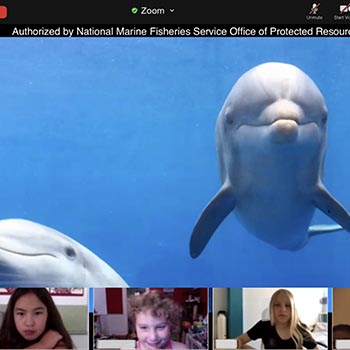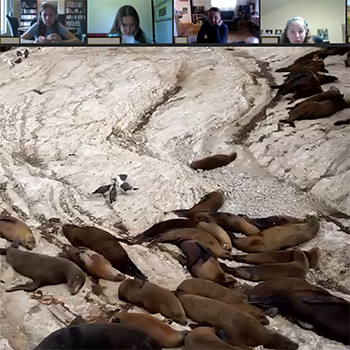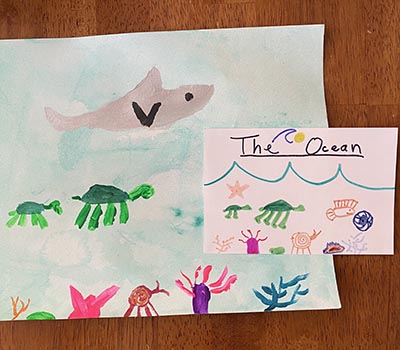Campus News
Going with the flow—famed Ocean Explorers Summer Camp heads online
COVID-19 compelled the Seymour Marine Discovery Center to take its popular Ocean Explorers Summer Camp virtual after running the program in person for 21 years—a successful experiment that presented both challenges and opportunities.



For Emily Kojima, one of the most exciting things that happened this summer was participating in live, virtual, front row seat encounters with different marine mammals.
Kojima, age 10, was one of 100 youth who attended a first-of-its-kind virtual summer camp offering from UC Santa Cruz’s Seymour Marine Discovery Center.
Since 1999, the Seymour Center has delivered the highly respected and popular Ocean Explorers Summer Camp—an in-person day camp offering different week-long marine science educational programs to children ages 7 to 14.
With the COVID-19 pandemic upending most in-person summer camps, however, the Seymour Center—with an already full registration list for the in-person program by spring of this year—had to quickly adapt their long-standing camp to a distance-learning format through Zoom software.
In anticipation of the remote format, Katrina London (Rachel Carson ’97, marine biology), youth programs assistant manager at the Seymour Center, wanted to ensure that the content was going to be just as engaging as it was in person, and there would be ample opportunities for students to build connections with their peers.
“My motto as I was creating the content and preparing to deliver it online was ‘connection before content’ to build a sense of community for students,” said London.
It was crucial to add that level of personal connection through a variety of games and activities before diving into the content of the camp to ease into a distance-learning format and keep participants actively engaged.
The Ocean Explorers Camp, which began programming the week of June 22 and concluded on August 7, successfully delivered week-long sessions, fully online for the first time since the program started.
From interactive learning activities to up-close and personal marine animal virtual visits, students immersed themselves into the world of marine science discovery and interacted with instructors, marine scientists, and animal trainers.
Virtual programs offered
The center had three summer camp offerings: Something’s Fishy, Marine Science for Girls, and Masterful Marine Mammals. And just like what happens each year for the in-person programming, every session ended up reaching registration capacity, with more than half of the original in-person camp registrants retained in the virtual camp.
The Something’s Fishy program, for ages 7 to 9, transformed children into fish scientists for the week, where they learned about different species of fish, their adaptations, and their habitats. Instructors presented behind-the-scenes footage of the Seymour Center, with live streaming of the center’s aquarium.
The Marine Science for Girls program, for ages 9–11, and the Masterful Marine Mammals program, for age groups 9–11 and 12–14, partnered with two research labs based out of the world-renowned UC Santa Cruz Long Marine Laboratory, the Marine Mammal Physiology Project and the Pinniped Cognition and Sensory Systems Lab, to deliver live streaming with marine science researchers and their work with the resident marine mammals.
The live streaming sessions at the labs included screen time with some special guests: two bottlenose dolphins, a Hawaiian monk seal, a harbor seal, a bearded seal, a ringed seal, and a California sea lion.
“One of the highlights of being virtual was that participants were able to get even closer to the animals via camera and interact with them in ways that wouldn’t have been possible with a large in-person group,” said Kevin Keedy (Crown ’89, biology; M.A. ’95, education), Seymour Marine Discovery Center youth programs manager.
Keedy noted that a main objective of both marine programs was for participants to see what the process is like to conduct mammal research.
In addition to the interactive activities with the researchers and marine mammals, students also embarked on virtual field trips to research sites, one being the famous Año Nuevo Reserve, where they interacted with Reserve Director Patrick Robinson (Rachel Carson ’03, marine biology; Ph.D. ’09, ecology and evolutionary biology) and observed the myriad of elephant seals, California sea lions, and Steller sea lions inhabiting the island and mainland.
A personal experience
Kojima, a first-time participant in the Masterful Marine Mammals 9–11 age group session, joined the week-long camp via iPad in her family’s South Lake Tahoe home.
When being interviewed on the phone with her mom Caroline, Kojima recounted the captivating content that was delivered in her session and named a couple of her favorite activities during the week.
She really enjoyed studying the bottlenose dolphins and learning how their physiology differs from ours.
“We compared our human resting breathing rates and active breathing rates after different intervals of exercise to the resting and active breathing rates of dolphins,” said Kojima.
“We also took a virtual visit to Año Nuevo, where we got to see the northern elephant seals up close with researcher Patrick. We learned how each colony of elephant seals has a different colored tag so that researchers can track their movements and know which colony they belong to,” declared Kojima.
Año Nuevo Reserve acts as a main breeding colony for northern elephant seals and an important research site for marine scientists.
Diverse participation
The in-person Ocean Explorers Camp generally reaches a broad audience, with students attending from out of state and sometimes even internationally; however, this year, the program was able to garner an even more diverse audience. Out of 100 total participants, 17 zoomed from out of state, and there were even a couple from out of the country—one from Ecuador and one from Costa Rica.
“Students who normally wouldn’t have been able to join the camp were able to this year due to the online format, which creates a silver lining of going virtual,” said London.
When asked about plans for next summer, London stated that they are brainstorming ways to incorporate a hybrid model so they can offer both in-person and virtual sessions, as long as it’s safe to resume in-person camps and there are enough “hands on deck.”
“One of the greatest outcomes of the Ocean Explorers Virtual Camp being a success is seeing all the potential for new opportunities to arise,” said Keedy. “In addition to looking at a hybrid approach for our future summer camps, we are also beginning to brainstorm ideas of offering after-school programs and additional camps throughout the year.”
To learn more about the Ocean Explorers Summer Camp and hear what past participants and families have to say, visit the Seymour Marine Discovery Center Ocean Explorers page.
Due to the impact of COVID-19 affecting in-person operations, the Seymour Center had to significantly downsize its workforce. Please consider making a gift to sustain the center’s mission of offering marine science and ocean conservation educational programming to the community.